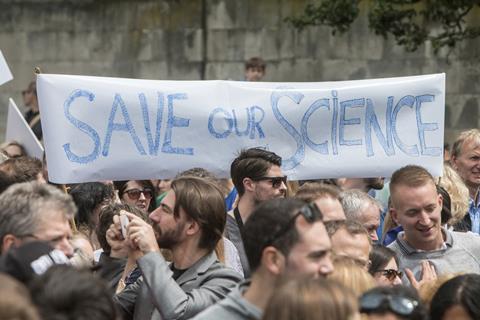UK science needs to move from protest to progress on Brexit
The odds are you voted remain. Polls, the media, the pub, all suggest that scientists overwhelmingly wanted Britain to stay in the EU – a Campaign for Science and Engineering survey, held back in December 2015, found that 93% of British researchers felt that EU membership was ‘a major benefit’ to UK science and engineering; only 3% thought it was a hindrance.

And so it’s likely your voice was echoed in the laments that have followed the vote to leave. Paul Nurse said that leaving the EU is the ‘biggest threat in living memory’ to research. However, as Imran Khan, chief executive of the British Science Association, pointed out in the Guardian, scientists risk ‘looking like an out of touch elite’ by grieving for the very things that most worried Brexiters: money and migration.
The majority of voters saw the flow of funds and people around the EU as a threat that only Brexit could solve, not as a boon that only remaining could save. Khan asks us to address the skewed demographic of scientists – university educated (and parents that were the same), from more affluent backgrounds, from the south of England. The stark difference of opinion on remaining in Europe by age, by location, by education and by class speaks to divisions in our society far greater than views on membership of the EU.
It seems clear now that the UK is firmly on course to leave the EU in a few years’ time. However, as put so eloquently by Ian Hislop on a recent Question time, even if you lose the vote you are entitled to go on making the argument. British scientists need to communicate their priorities clearly to government, to the nation and ensure that the interests of science are represented in the negotiating room as we begin the Brexit process. And, as we seek to re-affirm or forge new international relationships in Europe and beyond, we need to protect our reputation for world-class science, openness and exchange.
It is telling that the Universities UK Brexit FAQs for universities and students has a recurring theme: there are no immediate changes, but this may change. In the short term, we must seek clarity to help deal with this uncertainty, though assurances may be hard won while the UK government and civil service is dusting itself off. European students and colleagues need support and some measure of stability, and the suggestion that UK researchers are already being ditched from EU research bids is worrying.
The Royal Society of Chemistry is working hard on behalf of UK chemists, and in collaboration with the European Chemical and Molecular Society and other partners in academia and industry at home, in Europe and internationally, to bring about the best future for research. Its priorities are maintaining research and innovation funding at the present level; easy movement of skilled scientists and students to and from the UK; and clear and high quality regulation to support UK citizens, businesses and researchers. If you have been or expect to be affected by the changes please email science@rsc.org and let us know.












No comments yet